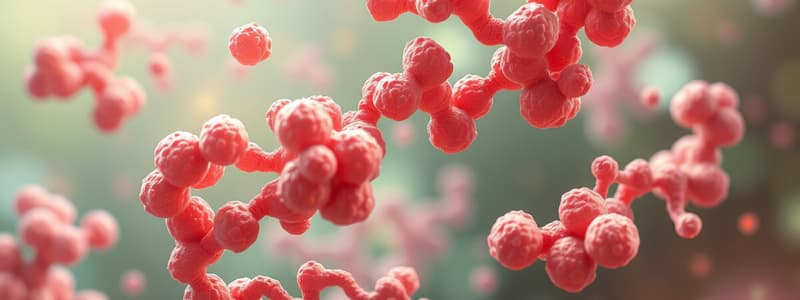Podcast
Questions and Answers
Which property enables stem cells to maintain their population through cell division?
Which property enables stem cells to maintain their population through cell division?
- Differentiation
- Embryogenesis
- Self-renewal (correct)
- Potency
What type of stem cells can create a complete viable organism?
What type of stem cells can create a complete viable organism?
- Pluripotent stem cells
- Multipotent stem cells
- Totipotent stem cells (correct)
- Unipotent stem cells
What is the primary benefit of using animal models in the study of human genetic diseases?
What is the primary benefit of using animal models in the study of human genetic diseases?
- They are cheaper than developing new drugs for humans.
- They replicate many human disease phenotypes and aid in drug discovery. (correct)
- They can replace the need for human trials entirely.
- They allow for the direct observation of human emotions in animals.
Flashcards are hidden until you start studying
Study Notes
Anti-bodies Production
- Hybridoma cells are produced by fusing B-lymphocytes with myeloma cells, allowing for the production of monoclonal antibodies.
- HAT medium is essential for isolating hybridoma cells; it supports the growth of hybrid cells while inhibiting the unwanted cells.
- Hybridomas are capable of producing large quantities of monoclonal antibodies for therapeutic and diagnostic applications.
Protein Sorting and Secretion Pathways
- Protein sorting refers to the mechanism that directs proteins to their proper locations within or outside the cell based on intrinsic signals within the protein.
- Key signal types include:
- Signal Sequence: Peptide at the N-terminus guiding proteins to the secretory pathway.
- Mitochondrial Targeting Signal (MTC), Nuclear Localization Signal (NLS), and Peroxisomal Targeting Signals (PTS) direct proteins to mitochondria, nucleus, and peroxisomes respectively.
- Post-translational translocation is a process where proteins synthesized in the cytosol are transported to organelles like mitochondria, chloroplasts, or peroxisomes.
Vaccines Types
- Attenuated Vaccines: Contain live pathogens with modified virulent genes (e.g., cholera). Risks include the possibility of causing the disease if the pathogens are not sufficiently attenuated.
- Subunit Vaccines: Utilize specific viral antigens or microbial proteins rather than whole organisms, exemplified by the hepatitis B virus vaccine.
- Vector Vaccines: Employ a non-pathogenic virus (such as vaccinia) to deliver genes for foreign antigens, stimulating an immune response.
Plant Genetic Manipulation
- Plant cells are cultured as suspension cultures in liquid medium or as callus cultures on solid medium. Achieving the right auxin and cytokinin balance is crucial for cell differentiation.
- Arabidopsis thaliana is a favored model for gene transfer studies due to its rapid growth and small genome size. It often uses Agrobacterium tumefaciens for gene introduction.
Plant as Bioreactors
- The first plant-produced pharmaceutical product was human growth hormone from transgenic tobacco in 1986.
- Plant bioreactors are advantageous for:
- Cost-effectiveness and scalability.
- Post-translational modifications.
- Absence of animal pathogens.
- Challenges include low yield of recombinant proteins and susceptibility to proteolytic degradation.
- Strategies for improving yields involve reducing protease activity and using proteinase inhibitors during culture and extraction.
Stem Cells Overview
- Stem cells have the capabilities of self-renewal and potency, enabling them to maintain their population and differentiate into various specialized cell types.
- Totipotent stem cells can form both embryonic and extra-embryonic tissues. They arise from the fertilization of an egg and can develop into a complete organism at the morula stage.
Studying That Suits You
Use AI to generate personalized quizzes and flashcards to suit your learning preferences.




